Graham Reid | | 13 min read
Robert Johnson: Crossroad Blues
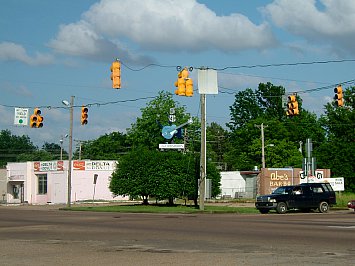
The intersection of highways 61 and 49 near Clarksdale in northwest Mississippi doesn't look particularly special: there's a car yard, a service station, a couple of kids listlessly kicking a ball outside Abe's barbecue shop . . . Just the usual stuff.
The only thing to distinguish it from hundreds of other such intersections in the state is the odd looking monument-cum-sculpture thing at the middle: only when you look closely can you decipher it. Guitars on top of a column.
"Hey brother, you got change for coffee?" barks a broke-down guy in overalls outside the service station.
I dig for a piece of folding, he shuffles off down a pathway between the mesh fences and wind-blown litter.
This, and nearby Clarksdale, is what we have driven up Mississippi to see. This is the crossroad. Not just any crossroad, but The Crossroad, the one where bluesman Robert Johnson allegedly made his pact with the Devil on a lonely midnight hour some time around 1930.
What is now a suburban sprawl of drycleaners, fast-food joints and rundown houses was once empty fields on the flat, almost featureless plain that is the Delta. It must have been kinda spooky at midnight -- although if you believe the sign on Abe's which says it's been there since 1924 then maybe Johnson and the Devil sat down for a plate of ribs.
Robert Johnson is a figure conveniently shrouded in myth: only two known photographs, poisoned by a jealous rival, and a formidable reputation that rests on a little more than a couple of dozen songs recorded, many of them eerie and haunted. Recent research shows however that Johnson was a marginal figure in his time and the story of his Faustian pact may have actually been inherited from Tommy Johnson, an earlier singer and no relation. But his music provided a cornerstone for the British blues revival in the mid 60s and a rediscovery of this seminal music.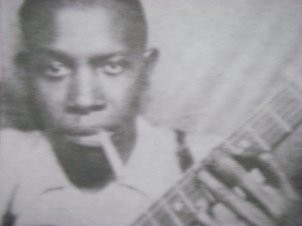
When a teenage Rolling Stone Keith Richards first heard Johnson play he wondered who the second guitarist was. The Stones, Eric Clapton, John Mayall and hundreds of others have recorded versions of Johnson's often spooky songs. It's a safe bet that fewer people know Johnson's music than his story: how he was a laughably inadequate young guitarist who disappeared for a while then came back full of spectral songs like Hellbound on My Trail and If I Had Possession Over Judgement Day.
His sound was so innovative, and unexpected, that rivals said he'd made a pact with the Devil. His songs Me and the Devil Blues and Crossroad Blues hinted at it. Conveniently feeding the legend is that Johnson has two graves in Mississippi -- one near Morgan City, the other south of Greenwood -- and some say the song Crossroad Blues has a curse on it. They cite the deaths in groups like Lynyrd Skynyrd and the Allman Brothers who covered it, and Clapton's troubled life as evidence.
This is the stuff of myth, and Clarksdale -- widely considered the crucible of the blues -- is steeped in it.
Clarksdale is where Bessie Smith died in 1937, but it is another blues myth that she was fatally injured in a car accident and turned away from the whites-only GT Thomas Hospital on Sunflower Avenue. Not true, it was a black hospital and she was admitted, but died anyway.
The old hospital was turned into the Riverside Hotel in 1944 -- and that's where we are aiming to stay, knowing nothing about it other than that it is pretty run-down. We turn away from the crossroad and drive along Sunflower -- "the wrong side of the tracks" as our sole guide book tells us bluntly -- and I pull the car over to talk to Megan.
We've just passed the Riverside, even in this rundown area it looked pretty seedy. "It was the place with those two old guys sitting out front."
She's game, so we drive back. We are greeted with sleepy gazes from hooded eyes and I say, "Is this the world famous Riverside Hotel?"
"I dunno 'bout world famous, but this sure is the Riverside," says the lean, rangy one from beneath his battered baseball cap.
"Well, we've come all the way from New Zealand and know about it, so it must be pretty famous."
They both laugh and I say we are looking for a room, is the manager around?
"I go get him," says the rangy one easing himself out of the battered chair.
He pushes open the screen door and bellows down the corridor, "Rat! Hey, Rat!"
No reply.
"Raaat!"
He comes back, settles into the chair, then after a long silence finally says, "Looks like he ain't 'round right now, but you'all jes go in and set yourselves down in the front room. He be along soon."
We enter a musty and dark corridor. It is lined with photographs of blues musicians and framed letters, and disappears into darkness with a lone window for light at the far end. The front parlour is an approximation of an office with sagging couches and a low table covered in magazines and stuffed ashtrays. As we wait I read the room.
There is a guitar in one corner, a pile of old amplifiers in another, an ancient keyboard covered in books and papers, and through the alcove what could pass for a desk. But it's hard to tell. It too is covered in books and paperwork. A ceiling fan flaps the thick air.
After a few minutes the rangy guy comes back in.
"Hell, I's just messin' with ya. I'm Rat," he laughs and extends a bony hand.
This is Frank "Rat" Ratliff, the son of the former owner and who has managed the hotel for the past 17 years. He was born here, grew up here, was bounced on the knees of Muddy Waters and a dozen other blues legends here, lives here most of the time, and for a while he ran his own juke joint downstairs at the back.
"You know Rocket 88," he says naming the 1951 Jackie Brenston hit that many consider the first rock'n'roll song. "That was writ by Ike Turner and he played it for the first time right here in this place. Oh yeah and Bessie Smith, she did die here in a room here, and John F Kennedy Jnr stayed here when he did his tour of the south."
For the next 20 minutes Rat beguiles us with stories, his philosophy on life, how everyone calls this place "home" even after the first day ("You'all jes call'n say, 'Rat, I'm comin' home' and I'll remember you") and the secret to a long and happy marriage like his. It seems to involve not living with his wife most of the time.
Eventually Rat thinks maybe we want to look at the room, he's got two he can show us. The first is at the front. It is dark and careworn but warm and comfortable, has a thick bed, chipped linoleum, faded wallpaper and hefty old sideboards. It has four ashtrays. The shared bathroom next door is cleanish and functional. We'll leave it at that.
Then he leads us lazily down the long, uneven floors of the narrow corridor to a room right at the back. We prefer the first one, and also can't imagine trying to negotiate the permanent twilight of the long corridor.
"Now that's a good choice because that's where John F Kennedy Jnr stayed."
The room where Bessie died is just down the hall opposite.
This is better than we could have imagined, the perfect introduction to Clarksdale. Put pinpoints on a map of Mississippi for every famous blues singer and a pattern emerges. Most came from around -- or gravitated to -- Clarksdale. Muddy Waters was born in a shack at an isolated cotton plantation just outside of town (it is now in the excellent Delta Blues Museum here) and to get here we have passed Parchman Farm -- the prison which at various times held Son House, Bukka White who served time for manslaughter, and Elvis' dad Vernon for altering a cheque.
We have passed Indianola where BB King grew up, and Greenwood where Johnson was poisoned (strychnine-laced whiskey apparently) and was the birthplace of Guitar Slim.
But it was always to Clarksdale we were bound, not fooling ourselves that we could feel something of the mystical spirit of the crossroad but just to see the museum and get out to some juke joints to experience blues in its birthplace. It is where John Lee Hooker, Ike Turner, Robert "Jnr" Lockwood, Jackie Brenston and a dozen other bluesman called home.
We hang out for a bit at the Riverside -- "Yo' home," says Rat at frequent intervals -- and that night head out to a juke joint. Rat recommends Ground Zero just up the road.
"You'all can walk there, jes keep to this side of the road 'cause there's people's houses on the other," he says somewhat mysteriously.
Clarksdale, with a population of around 20,000 is, at least this side of the tracks, a poor, predominantly black town. Houses and shops are abandoned and overgrown, the few cars that drive slowly by are battered and sunk low on busted suspensions. There's a broken baby carriage down by the muddy river, and the pervasive smell of hopelessness.
We walk around the shameful streets and the few people we see hang their heads, don't make eye contact, look away. It is the language of defeat. We walk on.
There is primitive graffiti on a large and non-descript warehouse which stands between empty lots. The footpath outside is cracked and uneven, weeds struggle their way through it.
We've found Ground Zero.
This isn't an oldtime juke joint that blues scholars and other such bores will tell you about, it was opened in May 2001 by a local businessman Bill Luckett in partnership with two local residents, actor Morgan Freeman and Howard Stovall whose family used to own the plantation where Muddy Waters was born.
But it serves down-home food and when we arrive there is a rocking little house band entertaining a couple of dozen patrons in various states of intoxication. A toothless, squat woman with huge breasts counterbalanced by a shelf-butt dances like a demented wind-up doll when the music and the beer kicks in. Two implant-blonde trailer-trash gals shoot pool with some mulletheads in the corner, a charming black woman who serves tables and the guy behind the bar make us feel real welcome.
The trio on the small stage -- a drummer of indeterminate age, an attractive young woman on keyboards, and an old guy sitting on a stool playing growling, electric guitar -- rips through some classic covers and originals, pass the hat for tips, engage in banter with friends in the small but enthusiastic crowd, and plug their CD. The guitarist has hedged his bets on a stage name, he is Howl N. Mudd.
We pass the night over beers, cigarettes and fried catfish to the sound of elemental blues in its birthplace. Just what we wanted. There are guitars hung from the walls -- the white one above the bar signed in a crude hand by John Lee Hooker -- and band posters plastered over the windows.
Half a dozen Japanese guys come in weighed down by cameras. They don't drink but photograph everything in the place. Then video it. Then make notes.
Reading the mass of graffiti on the walls and tables -- mostly by college students we guess, and encouraged by management to lend character -- is entertainment in itself. In the men's room is the memorable couplet above the urinal: "I wish I was a ring upon my true love's hand, so every time she wiped her arse I could see the promised land."
The following day we spend at the Delta Blues Museum at the old railhead just across the dusty parking lot, and amble round the almost deserted town baking in a flat heat. When it comes time to leave the famous Riverside Hotel we can't find Rat. We owe him money and have the room key but his office is locked. The place is silent and deserted, despite there being a few longterm residents.
I wander the corridor looking for him and give up.
A fly buzzes in aimless circles in the thick heat of the hallway.
We sit on the battered chairs out front.
A loping, middle-aged black guy comes down the road and says he's been thrown out of his house and wants a room. He introduces himself as George. I tell him Rat isn't around.
"S'alright, I'll go to the store."
"If I see Rat I'll tell him."
"No matter," George says and ambles off scratching his backside.
It's too hot outside. I go in and scan the magazine and newspaper clippings in the hallway which confirm Kennedy being here in 91 -- "I've had fun here" reads one headline -- then get bored. Again we wait on the porch in the lazy heat.
There is no bird-song from the trees, no cars pass. We go to the post office and bank, walk the deserted streets, and come back.
Rat has returned. He's in a jovial condition so we sit in his front room and talk some more. He tells of his mother Mrs Z. L. Hill who loved this place, opened a cafe here and attracted the itinerant and local musicians for the homeliness and comforts. She died seven years ago but "this was her dream" so he continued with the spirit of the place.
Rat was born March 10 1940, "but I ain't got no white hair" he says lifting the baseball cap for us to check. Business has been slack since 9/11 and the Riverside's customers -- aside from locals thrown out of the house and the 10 or so longstay residents in the 23 rooms -- have always been international. His visitors’ books confirm this -- names from Austria, Japan, Germany, and England all stand out -- "and peoples in the States is jes beginning to learn 'bout this place. That's 'cause the blues left the south and went north, then went overseas".
On a battered shelf are about two dozen books on the blues which mention the Riverside.
"Peoples come here for the blues and all those people like Ike and Robert Nighthawk and Howlin' Wolf who stayed here. From the gospel to the blues, from the po' to the rich, they's all been here and when peoples come they all call this their home."
He fields calls from people wanting to book rooms, mentions in passing that Elton John also stayed here and, dropping his voice to a conspiratorial whisper says "the blues is black peoples singin' 'bout the white man, and some folks still ain't comfortable with dat."
These days the young kids aren't interested in the blues, it's all hip-hop for them, but blues tourism keeps the town alive: "There ain't no jobs here. There was cotton, and factories like where I worked, the Wonderbread factory, but they's all gone." When the factory closed Rat took over his mother's business fulltime. He moved in here then. He talks of his wife who is a schoolteacher and respectable in the town so he straightened hisself up so as not to be shameful to her. He's got five children (two with his wife and "three outside kids") and their mother raised them.
"But then Daddy stepped in and they get their learnin' from me. I'm in and out. I grew up in hard times but peoples said I grew up with a silver spoon. But I had to survive."
These days he's a local personality -- that's why he has to behave himself -- and this morning he went down to the lumberyard where he ran into some peoples. "They all wants me to stay and talk and I says I gotta go but they tell me, ‘Oh Rat, you gotta talk to us'. And I gotsta talk. I got time, I have to take it.
"My mother raised me and say that when you walk down the street and everybody is sittin' on their porches you gotsta to say hello to them all. If I misses someone I gets home and they call her and say, 'Oh, Rat didn't say hello.'
“So now I do, that's how my momma raised me."
In the hot room with it's patchwork wallpaper, faded mirror and framed photographs Rat offers his homespun philosophies -- he never worries about nothin' for more than 24 hours, after that its solved or gone way -- and says he has only ever slept maybe five or six hours a night.
He lights another cigarette and tells another story.
We pay him, then he launches into his philosophy on life again. Then more anecdotes. We make to go and he follows us out. He's the talkingest man I have ever met. He says he remembers everyone who has ever been to the place, not their names but their faces when they turn up.
"Now you jes remember when you wants to come back you jes ring Rat and say you wanna come home. Everyone jes call it home, y'unnerstand?"
Then he insists on showing us round two houses next door which he also owns. We're curious. They have notices to the effect that the properties are abandoned and they look pretty ropey. But when he opens them up they are spacious and clean. They smell like a geriatric spinster's house. The battered job-lot linoleum is scuffed and yellowed like the wallpaper, and the photos on the wall have come from magazines at least three decades ago.
But they are funky and comfortable, and apparently the Kennedy Jnr didn't travel alone. He had a "lady companion who stay in this one here, I think he stay in here with her too maybe," he says with a twinkling grin.
"But the story was . . . I don't know. I didn't see the lady."
We exchange handshakes, Megan gets her photo taken with him (he insists she stand on his left, the heart side) then he starts in on how he meets so many lovely young ladies and they all love him and he likes getting his photo taken with them on the heart side but that don't mean nothin' 'cause he has a wife and she unnerstand he ain't no ladies man now but he like the ladies and like meeting wit' them and ... We say goodbye to him and the historic, rundown but homely hotel where he lives. We drive down Sunflower, across the narrow bridge over the muddy river.
We are briefly in another Clarksdale, the more expensive and visibly white part of town. Then we loop back.
It's mid-afternoon when we again pass the crossroads where Robert Johnson sold his eternal soul to the Devil for the gift of music. Traffic is backed up by the car yard. We fill up at the service station with enough gas to get us to Memphis where Elvis, a local truck driver, arc-welded black blues and white country together and changed our world. I look across the forecourt past the crossroads.
There are a couple of kids listlessly kicking a ball outside Abe's barbecue shop.
Travelling Riverside Blues is a chapter in Postcards From Elsewhere
Like this? Then check out the interviews, reviews and overviews at Blues in Elsewhere.

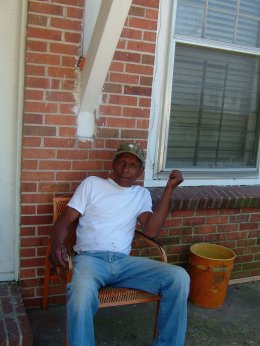
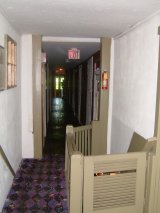
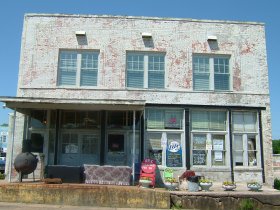
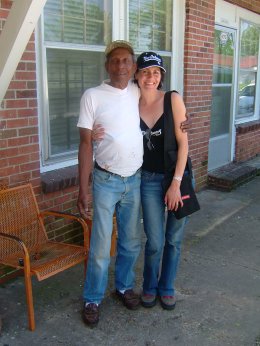
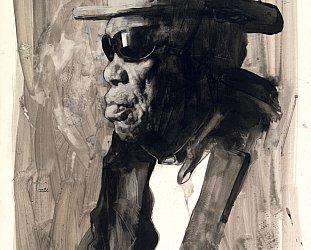
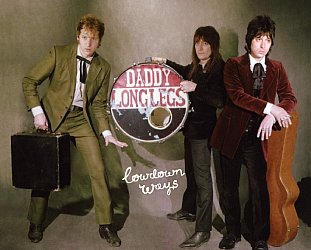
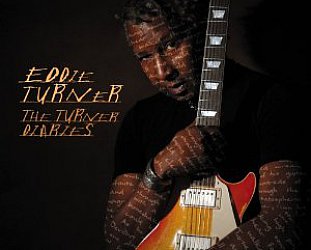
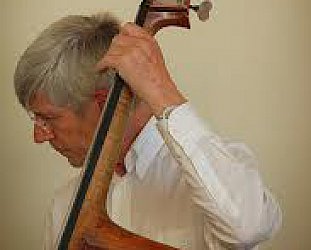
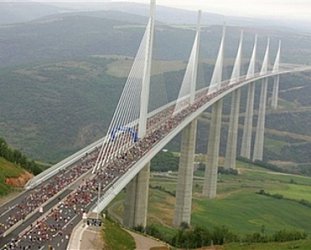
Scot - Sep 23, 2009
This article is right on! I have stayed at the Riverside twice in the last year and this article helped me re-live my stays and the interaction with Rat. The Riverside truly is a home away from home and Rat is such a gracious host. The man sure loves to talk though! Thanks for the article...
SaveSuzie Bobele - Nov 15, 2010
Rat was annoyed I wasn't staying there and wouldn't take a pic w. me (I stayed above Ground Zero) but did show me all the rooms/shared stories :) btw - there are 3 Robt. Johnson graves (Mt. Zion, Little Zion and Payne Chapel - where there's the family plot) - found Riverside Hotel's rooms clean/shiny & 'the suite' has its own private bathroom - Rat has gorgeous house on 7th and Illinois, next door to birthplace house of Sam Cooke - trying to find email addy of Rat's to say THANKS and send him some pics my hubby took of hotel/Rat ..Suzie
Savepost a comment